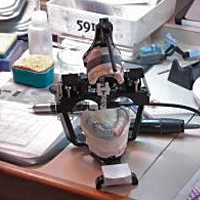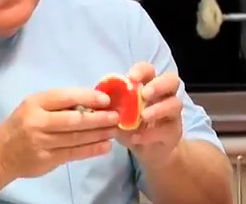
Unfortunately many people have the misconception that dentures last forever. However, dentures do not last forever and not replacing them when needed can cause numerous issues. Although it depends on an individual’s circumstance, as a good rule of thumb, dentures should be replaced about every 5-7 years. It is also important that dentures be replaced if they are worn or fit improperly to prevent problems.
How to Tell if You Need New Dentures
Over the years your jaw, face and tissues change. Your dentures or prosthesis do not change. Since your dentures are composed of inflexible and unyielding material, they will not adapt to your physical body changes. Here are some of the ways signifying that you need to replace your dentures or have them checked:
Since the changes happen slowly, signs that your dentures need to be replaced can easily go unnoticed. What is more, health and comfort are greatly compromised when poor fitting dentures are not replaced.
It is also important that you have your dentures and mouth checked once a year. A low cost consultation for a thorough assessment of you dentures and oral health may prevent high cost issues in the future. As well, the detailed assessment can determine if new dentures are needed.
Replacing your Dentures
You should never try to repair or adjust your dentures. Although you may think that repairing your own dentures will save money, you can cause permanent damage. In result, you will need to invest in a new set of dentures. In addition, self-assembly reliners can be unwieldy; and when reliners are large it can cause excessive pressure on the jaw and quick jawbone loss. Likewise, do it yourself bulky reliners can aggravate the soft tissues of the mouth.
Price and Product
When it comes to dentures, you pretty much get what you pay for. Lower priced dentures are made of low quality materials and can break easily. Moreover, cheaper dentures will last between ninety days and a couple of years. On the other hand, high quality dentures will last 5-7 years.
Problems Associated with Ill-Fitting Dentures
Not only are poor fitting dentures uncomfortable but they can cause other issues. For one, people who wear the same dentures for over 10 years oftentimes develop a prognathic bite. This is where the lower or upper jaw protrudes abnormally forward. Because the body changes, a prognathic bite is likely if the dentures are not replaced, regardless if they are porcelain teeth or acrylic.
Another issue is bone loss, and as we all know, bone that is lost will never grow back. Therefore, it is imperative and vital for regular yearly checkups. That way you get an in depth assessment of your oral health, prevent possible diseases and replace your current dentures if necessary.
How to Tell if You Need New Dentures
Over the years your jaw, face and tissues change. Your dentures or prosthesis do not change. Since your dentures are composed of inflexible and unyielding material, they will not adapt to your physical body changes. Here are some of the ways signifying that you need to replace your dentures or have them checked:
- Softening of mouth tissues
- Headaches, ear or neck pain
- Bone ridge reduction or loss
- You rarely wear your dentures
- Difficulty chewing certain foods
- Stomach and indigestion problems
- Irritated and sore gums or tissues
- Dentures have an odor or are discolored
- Dentures easily fall out when talking or laughing
- A change in facial features such as a sagging mouth or thinning lips
Since the changes happen slowly, signs that your dentures need to be replaced can easily go unnoticed. What is more, health and comfort are greatly compromised when poor fitting dentures are not replaced.
It is also important that you have your dentures and mouth checked once a year. A low cost consultation for a thorough assessment of you dentures and oral health may prevent high cost issues in the future. As well, the detailed assessment can determine if new dentures are needed.
Replacing your Dentures
You should never try to repair or adjust your dentures. Although you may think that repairing your own dentures will save money, you can cause permanent damage. In result, you will need to invest in a new set of dentures. In addition, self-assembly reliners can be unwieldy; and when reliners are large it can cause excessive pressure on the jaw and quick jawbone loss. Likewise, do it yourself bulky reliners can aggravate the soft tissues of the mouth.
Price and Product
When it comes to dentures, you pretty much get what you pay for. Lower priced dentures are made of low quality materials and can break easily. Moreover, cheaper dentures will last between ninety days and a couple of years. On the other hand, high quality dentures will last 5-7 years.
Problems Associated with Ill-Fitting Dentures
Not only are poor fitting dentures uncomfortable but they can cause other issues. For one, people who wear the same dentures for over 10 years oftentimes develop a prognathic bite. This is where the lower or upper jaw protrudes abnormally forward. Because the body changes, a prognathic bite is likely if the dentures are not replaced, regardless if they are porcelain teeth or acrylic.
Another issue is bone loss, and as we all know, bone that is lost will never grow back. Therefore, it is imperative and vital for regular yearly checkups. That way you get an in depth assessment of your oral health, prevent possible diseases and replace your current dentures if necessary.

